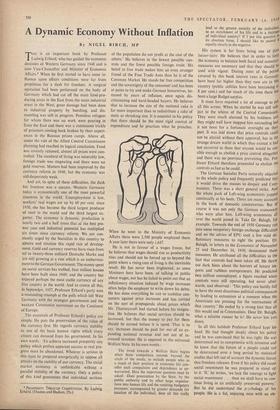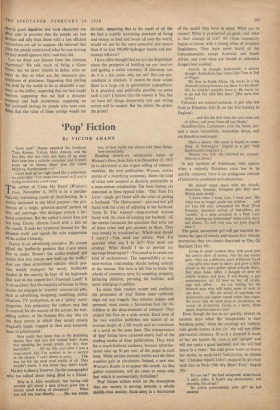A Dynamic Economy Without Inflation
By NIG.EL BIRCH, MP THIS is an important book by Professor Ludwig Erhard, who has guided the economic destinies of Western Germany since 1948 and is now Vice-Chancellor and Minister of Economic Affairs.* When he first started to have some in- fluence upon affairs conditions were far from propitious for a dash for freedom. A surgical operation had been performed on the body of Germany which had cut off the main food-pro- ducing areas in the East from the main industrial areas in the West, great damage had been done to industrial property by bombing, and dis- mantling was still in progress. Penniless refugees for whom there was no work were pouring in from the East and there was a continuous trickle of prisoners coming back broken by their experi- ences in the Russian prison camps. Above all, under the rule of the Allied Control Commission planning had reached its logical conclusion. Food was severely rationed, almost all prices were con- trolled. The standard of living was miserably low, foreign trade was stagnating and there were no gold reserves. Matters had been improved by the currency reform in 1948, but the economy was still-desperately weak.
And yet, in spite of these difficulties, the dash for freedom was a success. Western Germany today is economically one of the most powerful countries in the world. Unemployment is low, workers' real wages are up by 60 per cent. since 1950, she has become the third largest producer of steel in the world and the third largest ex- porter. The economy is dynamic, production is nearly two and a half times that of the best pre- war year and industrial potential has multiplied six times since currency reform. We are con stantly urged by the Socialists in this country to admire and emulate this rapid rate of develop- ment. Gold and currency reserves have risen from nil to twenty-three milliard Deutsche Marks and are still growing at a rate which is an embarrass- ment to the German Government. The money spent on social services has trebled, four million houses have been built since 1949; and the country has enjoyed perhaps the most stable currency of any free country in the world. And to crown all this, in September, 1957, Professor Erhard's party won a resounding triumph at the polls which left West Germany with the strongest government and the weakest Communist movement on the Continent of Europe.
The essentials of Professor Erhard's policy are simple. He puts the preservation of the value of the currency first. He regards currency stability as one of the basic human rights which every citizen can demand from his government. In his own words : 'To achieve increased prosperity any policy which prefers apparent success to real pro- gress must be abandoned. Whoever is serious in this must be prepared energetically to oppose all attacks on the stability of our currency. The social market economy is unthinkable without a parallel stability of the currency. Only a policy of this kind guarantees that individual sections * PROSPERITY THROUGH COMPETITION. By Ludwig Erhard. (Thames and Hudson, 25s.) of the population do not profit at the cost of the others.' He believes in the fewest possible con- trols and the freest possible foreign trade. His belief in free trade makes him an even stronger friend of the Free Trade Area than he is of the Common Market. He stands for free competition and the sovereignty of the consumer and has been at pains to try and make German housewives, be- mused by years of inflation, once again dis- criminating and hard-headed buyers. He believes that to increase the size of the national cake is far more important than to redistribute a cake of static or shrinking size. It is essential to his policy that there should be the most rigid control of expenditure and he practises what he preaches.
When he went to the Ministry of Economic Affairs there were 2,500 people employed there. A year later there were only 1,647.
He is not in favour of a wages freeze, but he believes that wages should rise as productivity rises and should not be forced up to beyond the point where a rising cost of living is the inevitable result. He has never been frightened, as some Ministers here have been, of talking in public about wages, nor has he failed to point out that an inflationary situation induced by wage increases, often helps the employer to write down his debts. He has done everything he can to mobilise con- sumers against price increases and has carried on the sort of propaganda about prices which Mr. Thorneycroft had started-before his resigna- tion. He believes that social services should be increased, but that the money to pay for them should be earned before it is spent. That is to say, increases should be paid for out of an ex- panding national revenue and not out of in- creased taxation. He is opposed to the universal Welfare State. In his own words : The trend towards a Welfare State begins when State compulsion extends beyond the circle of the needy, to include people who as a result of their position in economic life con- sider such compulsion and dependence as un- warranted. Here the important question must be asked : Does penetration by the State, by the public authority and by other large organisa- tions into human life and the resulting budgetary increases, accompanied by greater demands for taxation of the individual, does all this really lead to the greater security of the individual, to an enrichment of his life and to a decrease of individual anxiety? If I put this question in its absolute form, I should like to answer it equally clearly in the negative.
His system is far from being one of pure laisser-faire. He believes that in order- to keep the economy in balance-both fiscal and monetary measures are necessary and that they should be used with vigour. During most of the period covered' by this book interest rates in Germany have been far higher than they now are in this country (public utilities have been borrowing at 8 per cent.) and for much of the time there ha's been a large Budget surplus. It must have required a lot of courage to put all this across. When he started he was still sup' ject to the whims of the Control Commission. They were much alarmed by his boldness and they might well have stopped him succeeding had it not been for a fortunate oversight on their part. It was laid down that price controls could not be altered without their approval, but in the strange dream world in which they existed it had not occurred to them that anyone would be sen- sible enough to abolish a price control altogether and there was no provision preventing this. Pro- fessor Erhard therefore proceeded to abolish the controls as fast as he could.
The German Socialist Party naturally objected to the whole policy and frequently predicted that it would drive the masses to despair and Cool' inunism. There was a short general strike. And the whole pack of Left-wing economists yapped continually at his heels. There are many accounts in the book of domestic controversies. But of course it was not only the German economists who were after him. Left-wing economists all over the world joined in. Take Dr. Balogh, for example. Towards the end of 1950 Germany ran into some temporary foreign exchange difficulties and on the advice of EPU took a few mild de- flationary measures to right the position. Dr. Balogh, in letters to the Economist of November 25 and December 16, 1950, denounced these measures. He attributed all the difficulties to the fact that controls had w' the taken off. He threw out dark hints about the horrors of luxury im- ports and ruthless entrepreneurs. He predicted two million unemployed, a figure reached when controls were still operating, but never after- wards, and observed : 'This policy can hardly fail to have the most disastrous political consequences by leading to extremism at a moment when the Americans are pressing for the rearmament of that country.'. He ended by a strong hint that all this would end in Communism. Dear Dr. Balogh, what a reliable runner he is! He never lets you down.
In all this hubbub Professor Erhard kept his head. He had thought deeply about his policy and he was convinced that he was right. He was determined not to compromise with nonsense and he knew that the future of a people could not be determined over a long period by statistical studies that left out of account the dynamic forces that freedom releases. Even if his policy did cause social resentment he was prepared to stand up to it. 'If,' he writes, 'we lack the courage to fight social resentment . . . then we shall have to con- tinue living in an artificially preserved poverty.' But he did understand the psychology of his people. He is a fat, -enjoying man with an ob- ‘'inusly good digestion and such characters are often able to perceive that the people are less envious and silly than those with a less efficient Metabolism are apt to suppose. He believed that when the people understood what he was striving for they would approve of it—and they did.
Can we draw any lessons from the German experience? We talk much of being a Great power, but we never trouble to define what we mean by this or what are the necessary pre- conditions of greatness. Supposing that sterling Was held by the world to be as desirable a cur- rency as the dollar, supposing that we had ample reserves, supposing that we had a dynamic economy and high investment, supposing we bad increased savings by people who were con- fident that the value of those savings would not dwindle, supposing that as the result of all this we had a rapidly increasing standard of living and money to lend and invest all over the world, would we not be far more powerful and secure than if we had 100,000 hydrogen bombs and per- manent inflation?
I have often thought that we are too despondent about the prospects of building up our reserves and getting a stable currency. If Germany can do it in a few years, why not we? But one pre- condition is absolute. It cannot be done unless there is a large cut in government expenditure. Is it practical and politically possible to make such a cut? I believe that the answer is Yes, but we have left things desperately late and strong nerves will be needed. But the prizes, the prizes, the prizes !































 Previous page
Previous page